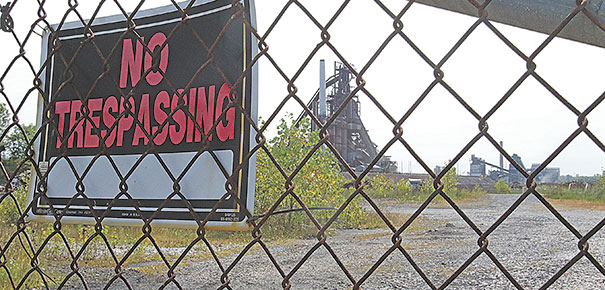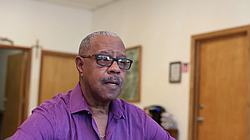Steel loss continues into 2000s

By Kalea Hall
YOUNGSTOWN
Darryl Parker remembers the steel industry

Darryl Parker, United Steel Workers Local 1375 President, looks back at steel in the Valley.
In just a few short years, two Mahoning County companies had closed up steel operations.
Result: 10,000 jobs were gone.
What was thought to be an iron-solid rock of an industry had crumbled.
But efficiency, a niche in the market and new investment kept Republic, which later became RG Steel, going until 2012.
“We actually transferred in workers from Youngstown Sheet & Tube” in 1977 said Denny Brubaker, former president of the United Steel Workers Local 1375 representing Republic workers.
GROWING UP STEEL
Brubaker, 66, of Struthers, like many other steelworkers, grew up knowing steel was what put food on the table for thousands of families.
“Growing up on Elm Road, you would see the blast furnace glow at night,” Brubaker said. “You’d see the sky turn orange.”
Brubaker got a job at Republic when he was a senior in high school.
“My neighbor across the street worked there,” Brubaker said. “Back then it was the Vietnam War [time] so they were always shorthanded. You passed the physical in the morning and started that afternoon.”
Brubaker got hired in the basic oxygen furnaces operation, where he took cast iron from the blast furnace and meddled it into steel.
“I went there for training, and I thought, ‘Oh God, I just got a job in hell,’” he said. “You would be fully covered but you’d still could get burnt.”
Republic in Warren was a narrow strip-steel company, unlike the steel companies shuttering around it.
Darryl Parker, 67 of Warren, worked for U.S. Steel’s McDonald Works for 13 years and nine months until the plant shut down.
Parker is the last president of USW Local 1375 before RG Steel closed in 2012.
Like Brubaker, he also grew up knowing the Mahoning Valley was the steel Valley. His uncles, his father figures, worked at the mills.
“The steel industry ... built communities within communities,” he said.
Immigrants came from the old country to Youngstown to get a job in steel.
“I had my first dandelion sandwich there,” Parker recalled.
One of Parker’s Italian friends handed him the sandwich with homemade bread, dandelion greens, peppers, olive oil and garlic.
Parker couldn’t wait to have another one.
STEEL’S DEMISE
As a black man, Parker got the rough jobs, but one of the supervisors in the plant saw his hard work and gave him advice.
“He said, ‘If you want to move up, learn everything you can,’” Parker said.
So he did.
For the past 10 years at U.S. Steel, Parker was an overhead crane operator.
“The supervisors said if you show profit we would keep you open,” Parker said. “Everyone busted their butt to show profit.”
But the unsightly end of U.S. Steel came anyway.
“We were coming across the bridge the last day of work and you had guys who were crying,” he said, recalling 1980. “It was sad.”
Parker cut grass and did his best to make ends meet until he got a job at Republic Steel in Warren in 1981.
“I was excited to do anything,” Parker said. “I didn’t want to be in the auto plant. I was a steel guy. I am a steel guy today.”
Greed is what Parker says led to the demise of steel in the Valley.
“Greed cost people livelihoods,” Parker said.
TROUBLE FOR RG
Brubaker went through what he calls World War III with the steelworkers in Local 1375 in 1995.
The workers at the Warren steel plant went on a 60-day strike. The issue was mainly pensions.
“I had the gray [hair] young,” Brubaker said.
The union was able to get the pensions from $550 a month to a $1,050 minimum.
The “war” broke up families with members on the management side and union side.
“We were the first fully integrated steel mill that the company tried to run with scabs,” he said. “It was a big war.”
On May 31, 2012, Parker’s birthday, RG Steel filed for bankruptcy. Parker had prepared for a layoff, but he didn’t know it would be a total shutdown, affecting 1,200 workers.
“We were making a profit, but [we] were a company of three facilities and we were the only one making profit,” Parker said.
To this day, Parker still works to make sure the steelworkers he represented receive all their benefits.
“My job is not done,” Parker said. “Today, I feel sad because we are blowing up blast furnaces. I think steel should be a part of our national security.”
 43
43
